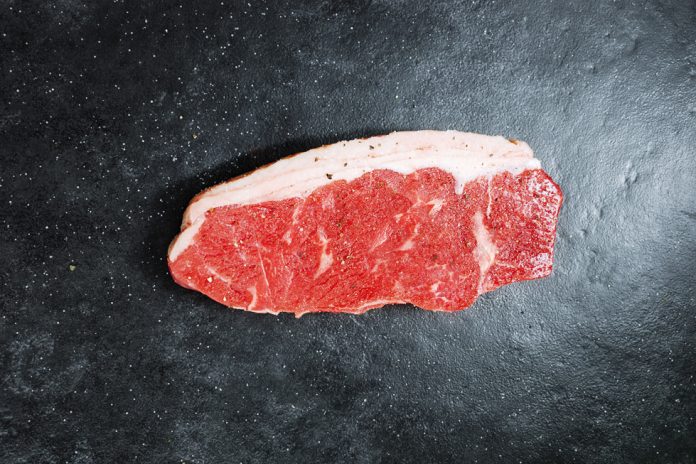By Dale Sproule
Imagine an inch thick T-bone steak the size of a dinner plate. Now try to imagine eating the whole thing in a single sitting. Sounds incomprehensible to me now, but as a teenager growing up in Alberta in the 70s, that was a typical Saturday dinner. How was that even possible?
Aaron Skelton, a slender young man with a ready smile, explains. “With most beef these days, you wouldn’t do it because you’d feel so full and boated. But that’s the corn in the beef. The feed for almost all cattle these days is concentrated dried corn – a huge energy source – but nutritionally void. But if the beef is grass fed, the fats are in balance, there are more nutrients and your body can absorb them quickly. It’s much easier to digest.”
As VP, Brands and Business Development at Greenspace Brands, Skelton is clearly not as young as he looks (a natural perk – one supposes – of eating well). With over 10 years experience coming up through the ranks in the health food category at Loblaws, he has a keen awareness of consumer preferences as well as changing health and dietary trends. That insight is apparent as he explains, how “truths” once held by science are now being challenged – like fats causing cholesterol, which ultimately leads to heart attacks.
“The science that’s coming out now is saying completely the opposite. You need fats – the trick is – the quality of the fats. When you look at omega and the benefits that omega has on brain function inflammation – those all need to be discussed when you talk about fats – so it’s not a single entity that you can just say you need a certain per cent of, you have to talk about the quality of it and that’s when we get to talk about how animals are fed and what the effect of that feed is on the products.
Their modest office in the basement of a heritage house in downtown Toronto feels more like a farmhouse than an urban space. There’s natural brick and rustic signage, plus a small kitchen, whose refrigerator is undoubtedly chock full of things like grass fed milk, butter and beef – after all, these are Canada’s two new gurus of grass-fed food.
They may seem new, but they’ve been around for awhile, says Matthew von Teichman, the founder and CEO of Greenspace Brands. “Our original brand was Life Choices Natural Foods. It’s been around for 13 years now.”
With a kind of Matthew-Perry-guy-next-door affability that makes him feel like an old friend that you just met, von Teichman seems genuinely excited to explain the evolution of his company. “The Life Choices brand started off as a frozen food company, but it’s morphed into a clean meat company – so it’s now kind of the Applegate of Canada. Better sourced meat and just fewer ingredients basically. Familiar family favourites – but healthier versions with simple ingredients. We have a breaded line that includes chicken nuggets and fish sticks and stuff like that. We have frozen burgers. We have Life Choices Fresh Hot Dogs.”
“Ideally, we should be drinking milk and eating meat and vegetables right off the farm. The gold standard is to cook, but that’s not realistic for everybody – at least not all the time. When the parents are both working and don’t have time to cook –we provide the next best option, it’s an excellent product – great sourced meat that’s as minimally processed as possible. When you’re pushed and you can’t make the best choice because of time, commitment whatever it happens to be … that’s what Life Choices is there for – so you can make the best choice possible. “
“Every product we have, adds Skelton, “is antibiotic and hormone free.”
Recent viral videos have helped galvanize the growing trend against the horrors of factory farming – and that in itself is a good enough reason to buy only free-range meat – but there are a lot more reasons to switch than simply feeling bad for the cows and pigs.
“People are more inquisitive about what they’re eating,” says von Teichman. “There’s always a cost.”
Sometimes the cost is moral, like giving yourself permission yourself to not think about pigs raised in tiny pens as you eat your bacon. There’s most definitely a nutritional cost – when you opt for corn-fed meat over pasture-raised, free-range meats. Beef from Greenspace’s Grandview Farms has been tested by U of T nutritionists, and shown to be 300 per cent healthier than commodity beef, with an Omega 6 to 3 ratio of 4.9:1. But usually, the cost is purely monetary – because meat that is more delicious, healthy and well marbled for tenderness will almost certainly be more expensive (although all their products are less expensive than “organic”).
Greenspace Brands are seeing evidence everyday that people would rather pay the monetary costs than the moral or nutritional ones. This was most obvious when they launched their Rolling Meadow Dairy products. The grass-fed milk is sourced from just a handful of farms (mostly Mennonite) in Southern Ontario.
“The higher fat skus tend to sell better,” says Skelton. “Even better than the lower fat – which is contrary to what you see in conventional milk. Our customers seem to know that it’s the quality of calories that count – that all calories aren’t the same.”
“The Grass-fed butter is probably the biggest hit we’ve launched,” says von Teichman.
Skelton becomes quite animated illustrating his delight at the consumer reaction. “Grass fed butter is crazy. It’s a crazy market. People will kill each other to go get it in the stores. Grass-fed butter is part of that diet – the bulletproof diet – it speaks to the fact that people are opening their eyes to quality fats.
The Bulletproof Diet, which counts Oprah Winfrey among its fans, advocates putting a tablespoon of grass fed butter in your coffee. You blend it with coconut oil (or specially formulated substitutes to create a kind of creamy, fatty caffeinated beverage. One Bulletproof diet page (Nextshark) claims: The short-chain fatty acid Butyrate, once thought to be bad for you, has been linked to preventing neurodegenerative diseases, increased energy expenditure, and is also anti-inflammatory, further preventing heart disease.)
Greenspace Brands has grown to encompass so many product lines that touching on all of them is a challenge, like Holistic Choice – the only non-rendered, antibiotic free, hormone free pet food line that’s Canadian made.
Skelton says, “Our goal coming into the market was to simply do pet food better. And now we’re raising the bar – using human grade, certified meat. And we’re going to use MSC certified fish – not like the leftovers from the fishing expedition. Putting this great food into a kibbled product and making it accessible to consumers.”
And they never did get around to talking about their Aussie Style Yamba Yogourt – which is made with Canadian grass-fed milk and sweetened with honey – it even comes in double serving containers so it’s easy to mix with granola.
So where do you find these Greenspace Brands?
The anchor brand, Life Choices, is in about 600 stores. Rolling Meadow is in about 200, Holistic Choice is easier to find in Loblaws than in pet food stores – but it’s in about 350 stores altogether. Grandview Farms Meats are becoming more and more well-known and popular. With Canada’s growing awareness of quality fats and growing appetite for grass-fed, this is a green space that may never stop growing.









